![Hero Image for The Top 11 AI Code Generators for Faster Programming [2025]](https://www.aicotra.com/wp-content/uploads/2025/05/7e84de22-28cc-4a75-86d2-44f94996ffde-2-1024x584.webp)
We’ve seen these assistants evolve from simple code completion tools into sophisticated pair programmers that help with writing new code, reviewing pull requests, creating test cases, and fixing bugs. The best AI code generators now offer context-aware suggestions across multiple programming languages, with options ranging from free tiers to enterprise solutions. For example, GitHub Copilot provides up to 12,000 completions monthly on its free plan, while specialized tools like Cursor excel with deep contextual understanding for advanced users.
Whether you need a python AI code generator to build machine learning projects, a java AI code generator for enterprise applications, or a versatile AI coding assistant that works across languages, choosing the right tool matters. Some excel at handling large codebases, others at real-time collaboration, and still others at specific languages or frameworks.
In this article, we’ll break down the top 11 AI code generators of 2025 to help you find the perfect match for your programming needs. From pricing and features to strengths and limitations, we’ve done the research so you don’t have to.
GitHub Copilot
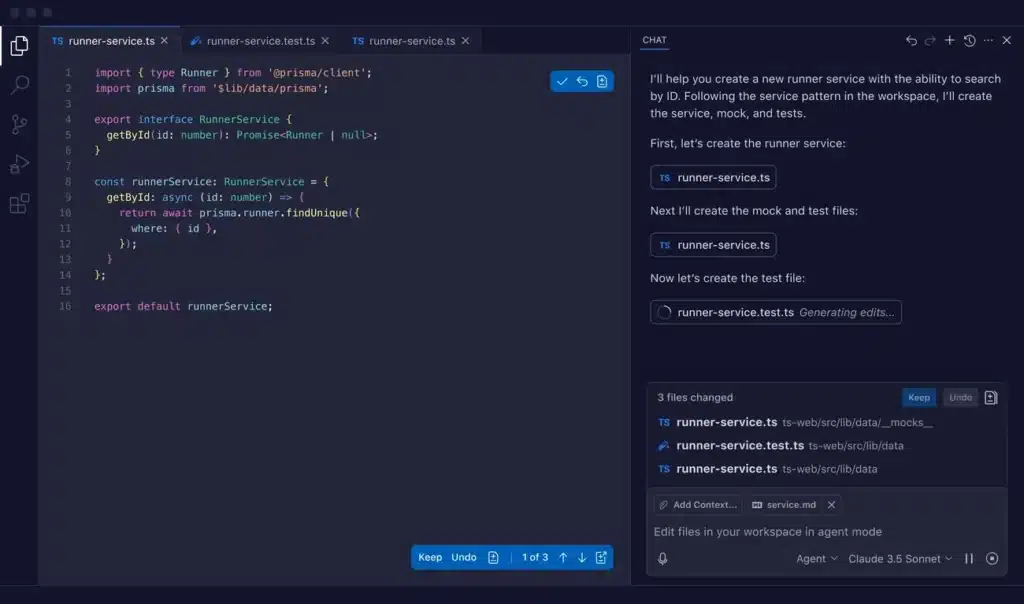
Image Source: GitHub
GitHub Copilot Key Features
At its core, GitHub Copilot offers contextualized assistance that helps developers focus more on problem-solving and less on mundane coding tasks.
Key capabilities include:
Code Completion: Provides real-time code suggestions as you type, with up to 46% of code coming directly from the tool Copilot Chat: Allows you to ask coding-related questions directly in your IDE, GitHub website, or mobile app Agent Mode: Analyzes code, proposes edits, runs tests, and validates results across multiple files Code Review: Examines your work to uncover hidden bugs and fix mistakes before human review Workspace Context: Uses the @workspace command to understand your entire project structure Knowledge Bases: Enterprise users can create collections of documentation to enhance contextual responses
GitHub Copilot Pros and Cons
Pros:
Increases developer productivity by up to 55% for coding tasks Improves job satisfaction by 60-75% among users Generates code that passes 53.2% more functional tests than code written without it Preserves mental effort during repetitive tasks (87% of users report this benefit) Supports a wide range of programming languages including Python, JavaScript, TypeScript, Go, Ruby, C++, and Java
Cons:
Suggestions occasionally miss the mark, requiring developer oversight Varying quality of suggestions depending on context and language Performance regressions compared to human-crafted code in some cases Requires internet connection for full functionality Risk of over-reliance for new developers
GitHub Copilot Pricing
GitHub offers multiple pricing tiers to accommodate different user needs:
Plan |
Price |
Key Inclusions |
|---|---|---|
Free |
USD 0.00 |
Limited to 2,000 completions and 50 chat requests monthly |
Individual Pro |
USD 10.00/month or USD 100.00/year |
Unlimited completions, premium models, 300 premium requests monthly |
Individual Pro+ |
USD 39.00/month or USD 390.00/year |
All Pro features plus higher usage limits and early access to new tools |
Business |
USD 19.00/user/month |
Collaboration tools, team management, usage insights |
Enterprise |
USD 39.00/user/month |
Advanced security & compliance, SSO, enterprise-grade support |
GitHub Copilot Best For
GitHub Copilot particularly excels for:
- Professional Teams: Organizations benefit from centralized management and policy controls while boosting developer productivity
Solo Developers: Freelancers can meet tight deadlines by generating client-ready code quickly Students and Educators: Helps learn best practices while coding in various languages Open Source Contributors: Free tier available for qualifying projects
Furthermore, the tool proves valuable for test-driven development, documentation generation, and debugging.
Tabnine
Image Source: www.tabnine.com
Tabnine Key Features
Tabnine differentiates itself through several standout capabilities:
Advanced Personalization: Learns from your project context and coding patterns to deliver increasingly relevant suggestions Privacy-First Approach: Uses zero data retention policy with ephemeral processing—your code is never stored or used to train models License Compliance: Models trained exclusively on permissively licensed code, eliminating legal exposure Deployment Flexibility: Available as SaaS, VPC, or fully on-premises for maximum control Contextual Awareness: Analyzes your entire codebase to provide relevant suggestions
Tabnine Pros and Cons
Pros:
Developers accept 90% of single-line coding suggestions, resulting in 11% productivity increase Some users report being 50% faster with coding and documentation Ranked first for code generation, debugging, and explanation use cases Never trains on your code, ensuring intellectual property protection Seamless integration with popular IDEs including VS Code, IntelliJ, and Eclipse
Cons:
Resource intensive with high memory usage that may affect performance Occasionally produces irrelevant suggestions that require developer correction Limited offline functionality compared to some competitors Initial learning period can affect early suggestion quality Some users report login stability issues
Tabnine Pricing
Tabnine offers multiple tiers to accommodate different user needs:
| Plan | Price | Key Features |
|---|---|---|
| Basic | Free | |
| Dev | $12/user/month | |
| Enterprise | $39/user/month |
Tabnine Best For
Tabnine excels primarily for:
- Enterprise Teams: Organizations in regulated industries (finance, healthcare, government) that require strict data privacy and IP protection
- Security-Conscious Developers: Those concerned about license compliance and data privacy
- Mixed-Environment Teams: Development groups working across multiple languages and frameworks
CI&T Developers: Companies seeking measurable productivity gains, as CI&T reported 90% acceptance of Tabnine’s suggestions
Codeium
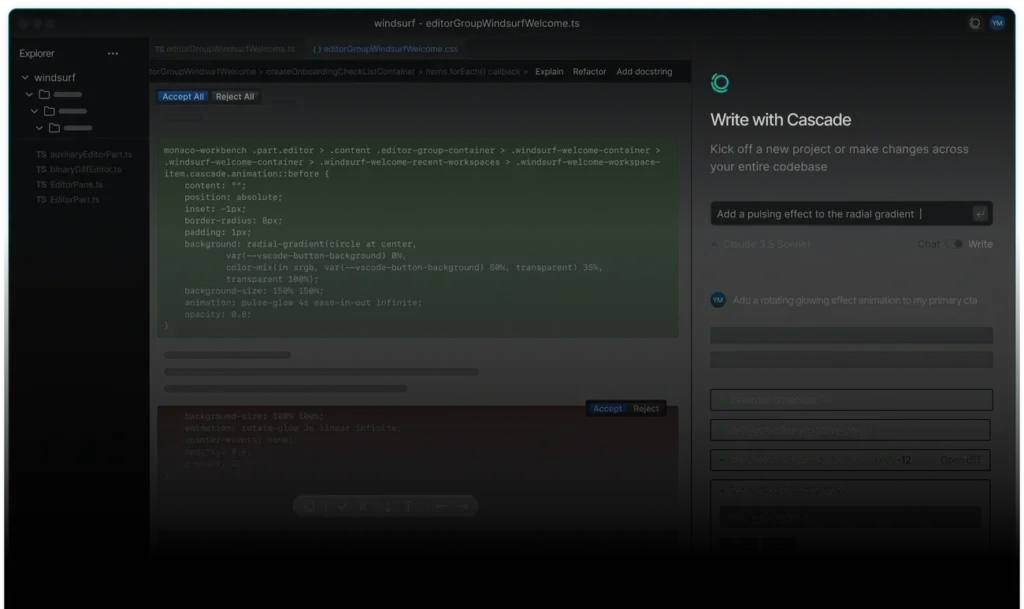
Image Source: codeium.com
Originally launched as a free alternative to GitHub Copilot, Codeium has rapidly gained traction among developers seeking a privacy-focused AI coding assistant. This open-source tool requires no GitHub or Microsoft credentials to deliver impressive code generation capabilities across numerous environments.
Codeium Key Features
Codeium distinguishes itself through several notable capabilities:
Extensive IDE Integration: Works seamlessly with VS Code, JetBrains, Jupyter, Vim, Sublime, Emacs, and more Multi-Language Support: Handles over 70 programming languages including Rust, Kotlin, Dart, C#, and PHP Privacy-Centric Design: Features transparent policies with opt-out data collection options In-Editor AI Chat: Provides contextual assistance for code refactoring, bug fixes, and documentation generation Natural Language Search: Helps navigate large codebases efficiently
Codeium Pros and Cons
Pros:
100% free for individual developers with unlimited usage No GitHub login requirement, enhancing accessibility Local/offline installation available for enterprise users End-to-end data encryption for security Privacy-focused with clear opt-out mechanisms
Cons:
Slightly less advanced AI compared to premium alternatives Some latency observed in longer code completions Smaller knowledge base as a newer tool Limited advanced topics coverage in some areas Basic context awareness in free version
Codeium Pricing
| Plan | Price | Key Features |
|---|---|---|
| Individual | Free | |
| Pro | $15.00/month | |
| Pro Ultimate | $60.00/month | |
| Teams | $35.00/user/month | |
| Enterprise | Custom |
Codeium Best For
Codeium is ideal for:
- Solo Developers: Those seeking a powerful, completely free coding assistant without limitations
- Privacy-Conscious Teams: Organizations requiring transparent data policies and control options
- Multi-Environment Coders: Developers who work across various IDEs and languages
Resource-Conscious Users: People working on smaller projects with lightweight setups
Consequently, Codeium emerges as an excellent choice for developers who prioritize privacy alongside versatility and cost-effectiveness. Its commitment to remain free for individual users makes it an attractive alternative to premium ai code generators, particularly for those just beginning their coding journey or working on personal projects.
Amazon CodeWhisperer
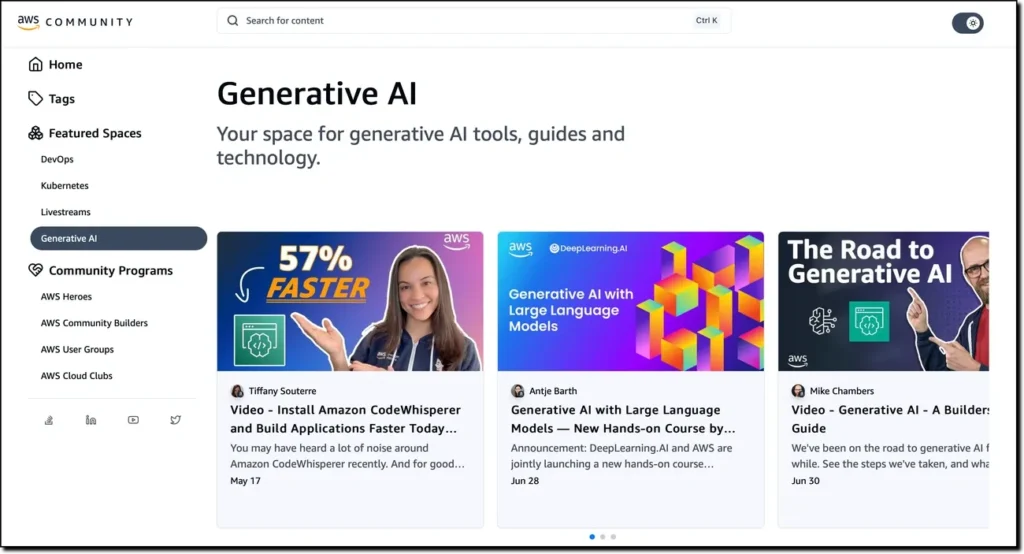
Image Source: AWS
Designed by AWS, Amazon CodeWhisperer serves as an AI-powered coding companion that generates real-time suggestions directly in your development environment. Recently, its features have been integrated into Amazon Q Developer, expanding its capabilities beyond basic code completion.
Amazon CodeWhisperer Key Features
CodeWhisperer offers several distinctive capabilities:
Intelligent Code Generation: Provides contextual code suggestions ranging from single lines to complete functions based on your comments and existing code Security Scanning: Integrates with Amazon CodeGuru to detect vulnerabilities like exposed credentials and log injection, offering AI-powered remediation suggestions Reference Tracking: Identifies and flags code suggestions that resemble publicly available code, providing repository URLs and license information AWS Optimization: Delivers tailored recommendations for AWS services and APIs following best practices Multi-Language Support: Handles 15 programming languages including Python, Java, JavaScript, TypeScript, C#, Go, Rust, PHP, Ruby, and more
Amazon CodeWhisperer Pros and Cons
Pros:
Excels in AWS ecosystem integration with optimized suggestions for cloud services Comprehensive security scanning highlights vulnerabilities and suggests fixes Free tier available for individual developers with no financial commitment Strong support for serverless architecture development Built-in reference tracking for responsible open-source code usage
Cons:
Limited language support compared to some competitors Requires AWS platform dependency for some features Learning curve may be steep for developers unfamiliar with AWS Non-deterministic suggestions require cycling through options for optimal results
Amazon CodeWhisperer Pricing
| Plan | Price | Features |
|---|---|---|
| Individual | Free | |
| Professional | $19.00/user/month |
Amazon CodeWhisperer Best For
CodeWhisperer particularly shines for:
AWS Developers: Those building applications using AWS services like Lambda, S3, and DynamoDB Security-Focused Teams: Organizations prioritizing vulnerability detection and code safety Serverless Architects: Developers working extensively with serverless applications Individual Learners: New programmers seeking cost-effective assistance without financial commitment
AskCodi
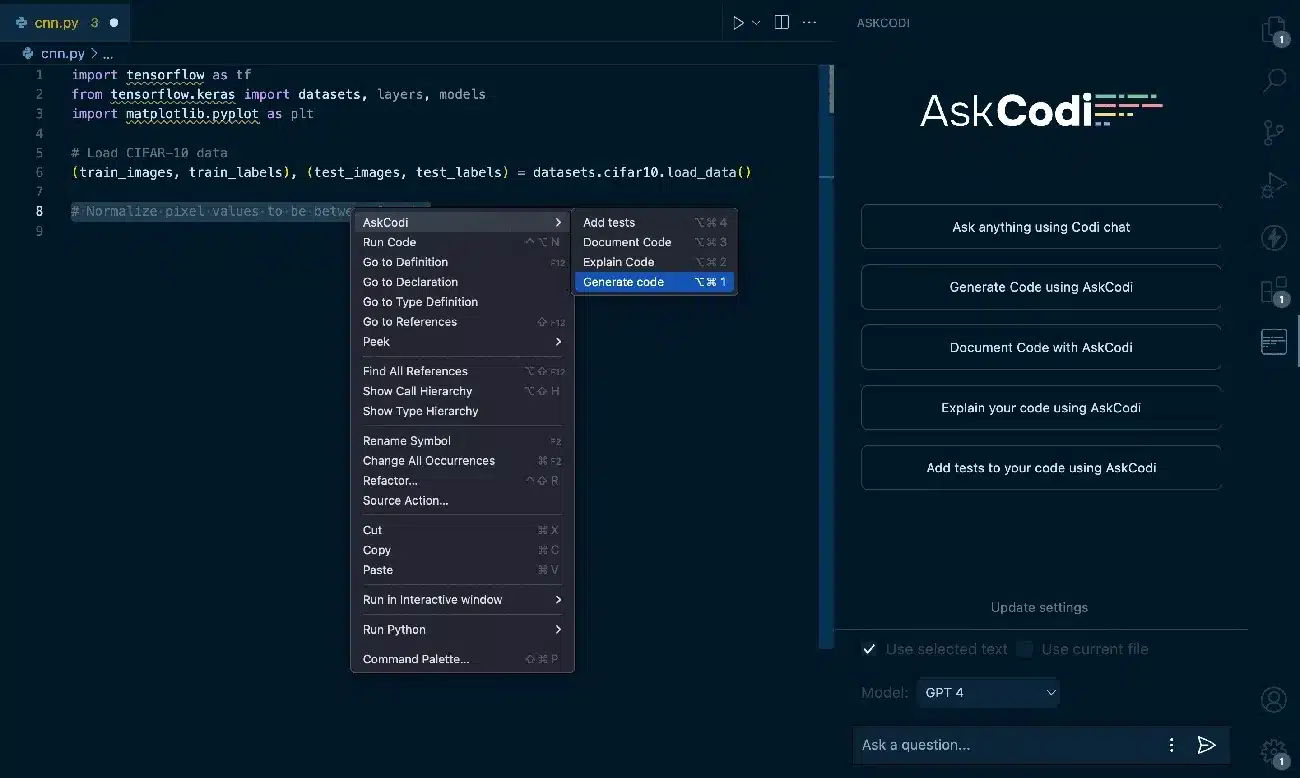
Image Source: AskCodi
As a specialized AI coding assistant, AskCodi delivers a comprehensive suite of programming tools designed to streamline development workflows across multiple languages and frameworks. This tool distinguishes itself by focusing on specific coding applications rather than just general code completion.
AskCodi Key Features
AskCodi offers a rich ecosystem of specialized coding tools:
Code Generator: Creates code snippets based on natural language descriptions Multiple Coding Apps: Includes Code Refactor, Bug Detector, Language Translator, and Documentation tools Regex Generator and Explainer: Builds and explains regular expressions Sandbox Environment: Provides real-time building and testing for front-end code Multi-Model Integration: Accesses 10 state-of-the-art AI models from companies like OpenAI, Google, and Anthropic Privacy Protection: Does not save or train on user code, protecting intellectual property
AskCodi Pros and Cons
Pros:
Increases developer productivity with precise, to-the-point answers Versatility across numerous programming languages and frameworks Excellent time-saving capabilities for documentation and unit testing Privacy-focused design that doesn’t store your code Robust IDE integration prevents workflow interruptions
Cons:
Occasionally slow response times Limited free credits (50 per month) in the basic plan Can be challenging to format queries properly Risk of over-reliance for beginners Premium features require subscription
AskCodi Pricing
| Plan | Price | Key Features |
|---|---|---|
| Free | USD 0 | |
| Premium | USD 149.99/year | |
| Ultimate | USD 349.99/year |
AskCodi Best For
AskCodi is ideally suited for:
Professional Developers: Those seeking to eliminate redundant coding tasks Full-Stack Teams: Developers working across multiple languages and frameworks Documentation-Heavy Projects: Teams that need automated documentation generation Regex Users: Programmers who frequently work with complex regular expressions Privacy-Conscious Developers: Those concerned about code ownership and data security
In essence, AskCodi serves as a specialized ai code generator that excels in structured coding tasks rather than general assistance, making it particularly valuable for developers who need focused tools for specific programming challenges.
Codiga
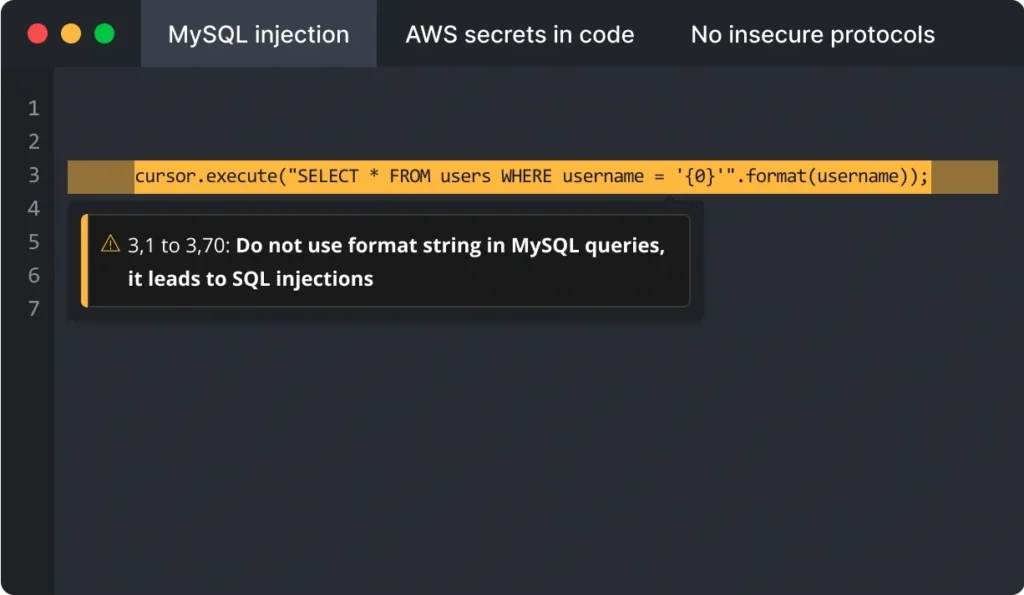
Image Source: www.codiga.io
Recently acquired by Datadog, Codiga focuses on code quality and security through its AI-powered static analysis tools that integrate directly into your development workflow. Unlike many AI code generators that primarily create new code, Codiga excels at analyzing existing code to detect issues before they reach production. While most AI code generators emphasize code generation, Codiga complements them by enhancing code safety and maintainability. This unique approach makes Codiga a valuable tool alongside traditional AI code generators, providing developers with both creation and quality assurance capabilities.
Codiga Key Features
Codiga delivers several standout capabilities:
Real-Time Code Analysis: Identifies issues and suggests fixes as you code directly in your IDE Custom Analysis Rules: Create and test your own static code analysis rules in under 5 minutes Security-Focused Scanning: Supports OWASP 10, MITRE CWE, and SANS/CWE Top 25 standards to detect vulnerabilities Smart Code Snippets: Create, share, and discover reusable code patterns Broad Integration: Works with VS Code, JetBrains IDEs, Visual Studio, GitHub, GitLab, and Bitbucket
Codiga Pros and Cons
Pros:
Detects issues in real-time with instantaneous feedback Teams save approximately 2 hours per week through snippet reuse Automated security fixes directly in the IDE Detects leaked secrets like SSH keys and API tokens Multi-branch support with historical analysis capabilities
Cons:
Limited to static analysis; struggles with dynamic runtime errors Basic version restricted to 10 analyzes per day Resource intensive when running continuous analysis Learning curve for creating custom rules Requires Node.js for setup
Codiga Pricing
| Plan | Price | Features |
|---|---|---|
| Free | USD 0.00 | |
| Silver | USD 10.00/month | |
| Gold | USD 18.00/month | |
| Team | USD 14.00/month |
Codiga Best For
Codiga is ideal for:
Quality-Conscious Teams: Developers prioritizing clean, secure code DevOps Engineers: Professionals integrating security checks into CI/CD pipelines Multi-IDE Teams: Groups working across different development environments Startups: Early-stage companies can access 20% discount for 12 months
Indeed, Codiga serves as more than just an ai code generator—it functions as a comprehensive code quality guardian that helps maintain high standards throughout the development lifecycle.
Replit AI
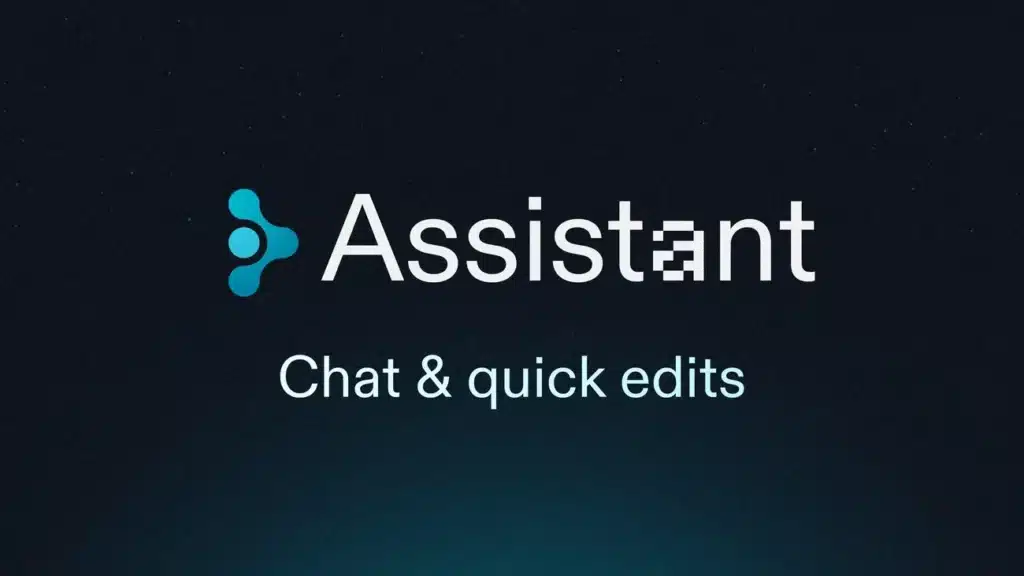
Image Source: Replit Blog
Replit AI transforms the development experience by acting as an AI code generator that enables anyone to build complete applications through natural language prompts. This innovative tool integrates directly into Replit’s cloud-based development environment, allowing both technical and non-technical creators to convert ideas into functional code without extensive programming knowledge.
Replit AI Key Features
Replit AI consists of two primary components:
- Agent: Generates entire projects and builds complex features from natural language descriptions
- Assistant: Explains code, makes quick fixes, and adds new functionality to existing projects
Key capabilities include:
- Natural Language to Code: Convert plain English descriptions into full-stack applications
- Integrated Cloud Services: Automatic configuration of databases, file storage, and authentication
- Mobile Development: Build apps from your phone with iOS and Android support
Real-Time Collaboration: Multiple users can edit and test simultaneously - Multi-Language Support: Works across numerous programming languages
Replit AI Pros and Cons
Pros:
Transforms natural language into working applications without coding experience - Enables rapid prototyping for software engineers
Streamlines data pipeline automation for data scientists Simplifies MVP creation for entrepreneurs and startups Offers real-time collaboration in a Google Docs-like experience
Cons:
Limited to Replit’s cloud-based environment Experimental nature may lead to occasional bugs or unexpected behavior Struggles with contextual understanding of complex prompts Performance issues with larger, multi-file projects Requires subscription for advanced features
Replit AI Pricing
| Plan | Price | AI Features |
|---|---|---|
| Basic | Free | |
| [Core | $10.00/month](https://rpltbldrs.com/p/replit-pricing-explained-2025) | |
| Teams | $35.00/user/month |
Replit AI Best For
Primarily, Replit AI excels for:
- Non-technical Creators: Anyone looking to build apps without coding experience
- Rapid Prototypers: Developers needing quick proof-of-concepts
- Educators and Students: Those learning programming through interactive examples
Solo Entrepreneurs: Founders building MVPs to validate business ideas - Collaborative Teams: Groups working together on software projects
CodeT5
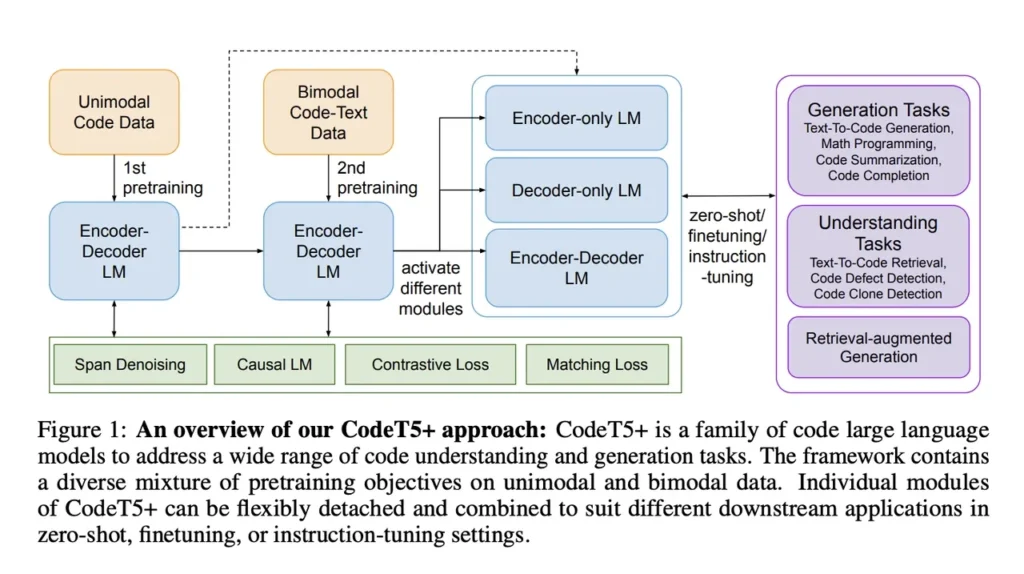
Image Source: LinkedIn
Developed by Salesforce Research, CodeT5 stands out as a code-aware pre-trained encoder-decoder model specifically designed for understanding and generating programming languages. This AI code generator bridges the gap between natural language and code, offering specialized capabilities for developers working across multiple programming environments.
CodeT5 Key Features
CodeT5 delivers several powerful capabilities:
Text-to-Code Generation: Converts natural language descriptions into functional code snippets Code-to-Code Translation: Translates between different programming languages, helpful when migrating projects Code Summarization: Creates concise summaries of code snippets for easier understanding of large codebases Identifier Awareness: Distinguishes whether each code token is an identifier with over 99% F1 score for all programming languages Multi-Language Support: Pre-trained on 8.35 million functions across Python, Java, JavaScript, PHP, Ruby, Go, C, and C#
Primarily, CodeT5 achieves state-of-the-art performance as an AI code generator on fourteen subtasks in the CodeXGLUE benchmark, outperforming previous models on all generation tasks.
CodeT5 Pros and Cons
Pros:
State-of-the-art performance on code intelligence benchmarks Built on proven T5 architecture with code-specific knowledge Accelerates implementation while reducing reliance on external resources Excels at translating between programming languages Enables faster documentation and easier software maintenance
Cons:
Limited accessibility compared to tools like GitHub Copilot or OpenAI Codex May not always provide the most optimal or relevant code suggestions Less efficient than some other tools for certain applications - Potentially narrower context understanding for complex projects
CodeT5 Pricing
CodeT5 Best For
CodeT5 is ideal for:
- Multi-Language Developers: Those working across different programming environments who need translation capabilities
- Documentation Teams: Projects requiring automatic summarization of code functions
- Research-Oriented Coders: Developers interested in state-of-the-art model performance
Apex Developers: Salesforce programmers who can leverage the AI-powered coding assistant built with CodeT5
Despite its research origins, CodeT5 offers practical applications through its ability to understand code context and generate appropriate solutions across diverse programming tasks.
OpenAI Codex

Image Source: OpenAI
Powering the development of GitHub Copilot and numerous other coding tools, OpenAI Codex is a powerful AI code generator that transforms natural language instructions into functional code across multiple programming languages. This AI code generator operates as both a cloud-based agent and a versatile coding assistant, capable of handling everything from simple snippets to complex software engineering tasks.
OpenAI Codex Key Features
OpenAI Codex delivers several powerful capabilities:
Natural Language to Code Translation: Converts plain English descriptions into executable code across multiple languages Multi-Task Agent: Works on multiple software engineering tasks simultaneously in isolated cloud environments Repository Understanding: Each task runs in its own secure sandbox preloaded with your repository Verifiable Evidence: Provides terminal logs and test outputs to trace steps taken during task completion Language Versatility: Supports over a dozen programming languages including Python, JavaScript, Go, Ruby, PHP, and TypeScript
OpenAI Codex Pros and Cons
Pros:
Completes approximately 37% of coding requests successfully Generates working solutions for 70.2% of prompts when given multiple attempts Excellent at mapping simple problems to existing code Can interface with services like Mailchimp, Microsoft Word, Spotify, and Google Calendar Handles coreference resolution impressively in natural language prompts
Cons:
Sometimes produces inefficient code or quirky implementations Struggles with multi-step prompts and can yield counter-intuitive behavior Approximately 0.1% of generated code contains direct copies from training data May create code with security vulnerabilities if not carefully reviewed Requires experienced oversight to evaluate appropriateness of solutions
OpenAI Codex Pricing
Currently, Codex is available through different deployment options:
| Access Method | Price | Features |
|---|---|---|
| ChatGPT Pro | USD 200.00/month | Access to Codex agent functionality |
| Codex CLI | USD 1.50/1M input tokens + USD 6.00/1M output tokens | Smaller version optimized for CLI use |
| Enterprise/Team | Custom | Full access to Codex capabilities |
OpenAI Codex Best For
OpenAI Codex particularly excels for:
Professional Development Teams: Engineers offload repetitive, well-scoped tasks like refactoring and test writing Cross-Service Integration: Projects requiring connections between multiple platforms and services Documentation Generation: Automatically creating explanations for complex codebases Remote Collaboration: Teams working asynchronously across different time zones
Sourcegraph Cody
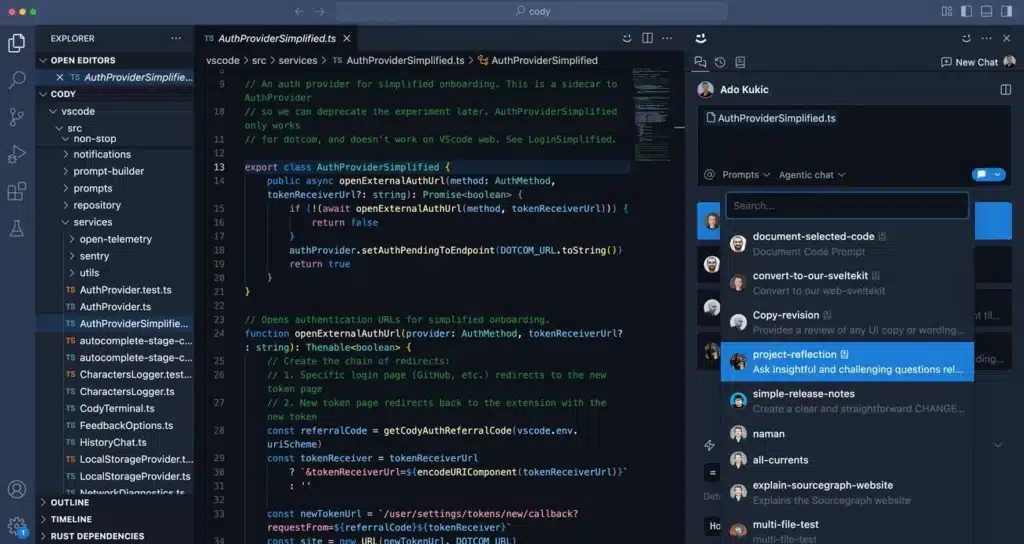
Image Source: Sourcegraph
With a focus on deep codebase understanding, Sourcegraph Cody delivers AI-powered coding assistance as an ai code generator that goes beyond the current file to encompass your entire project structure. This advanced ai code generator works seamlessly across multiple IDEs and programming languages, truly grasping the relationships between different components in complex codebases.
Sourcegraph Cody Key Features
Cody differentiates itself through several key capabilities:
- Comprehensive Context Awareness: Analyzes your entire codebase through code search and retrieval augmented generation (RAG) technology
Multi-LLM Flexibility: Supports numerous AI models including Claude 3.5 Sonnet, GPT-4o, and others from Anthropic, OpenAI, Google, and Mistral IDE Integration: Works with VS Code, JetBrains IDEs, Visual Studio, and Eclipse without changing your workflow Beyond Code Context: Integrates with non-code tools like Notion, Linear, and Prometheus to gather holistic context Secure Enterprise Focus: Offers options for self-hosting and custom API keys with strict security controls
Sourcegraph Cody Pros and Cons
Pros:
Engineers save approximately 5-6 hours weekly using Cody Doubles coding speed compared to working without AI assistance Excellent at understanding relationships between components in large codebases Cites sources used to generate responses, building developer trust Supports multiple LLMs, avoiding dependency on a single provider
Cons:
Sometimes provides inaccurate context in complex scenarios Occasionally fails to maintain consistent style throughout a single chat - Limited context accuracy in the free version compared to enterprise tiers
- Can be resource-intensive for some operations
Latest version occasionally ships with bugs
Sourcegraph Cody Pricing
| Plan | Price | Best For |
|---|---|---|
| Cody Free | USD 0.00 | |
| Cody Pro | USD 9.00/month | |
| Enterprise Starter | USD 19.00/user/month | |
| Enterprise | USD 59.00/user/month |
Sourcegraph Cody Best For
Given its capabilities, Cody excels for:
- Teams Working with Complex Codebases: Particularly valuable when navigating large enterprise systems
- Organizations Requiring Flexibility: Teams wanting access to multiple AI models rather than being locked into one provider
- Security-Conscious Enterprises: Companies in regulated industries needing strict data controls
- Multi-IDE Teams: Development groups working across different environments who need consistent AI assistance
Overall, Cody represents an excellent choice for teams seeking an AI code generator that truly understands their entire codebase context while maintaining enterprise-grade security.
Comparison Table
| Tool | Basic Pricing | Key Features | Languages Support | IDE Integration | Notable Pros | Notable Cons | Best For |
|---|---|---|---|---|---|---|---|
| GitHub Copilot | Free (2,000 completions) | Code completion, Copilot Chat, Agent Mode, Code Review | Python, JavaScript, TypeScript, Go, Ruby, C++, Java | VS Code, Visual Studio, JetBrains, Neovim | 55% productivity increase, 60-75% job satisfaction | Requires internet connection, Varying suggestion quality | Professional Teams, Solo Developers |
| Tabnine | Free (Basic) | Advanced Personalization, Privacy-First Approach, Contextual Awareness | 600+ languages | VS Code, IntelliJ, Eclipse | 90% acceptance rate of suggestions, Never trains on your code | Resource intensive, Limited offline functionality | Enterprise Teams, Security-Conscious Developers |
| Codeium | Free (Unlimited) | 70+ language support, Privacy-Centric Design, In-Editor AI Chat | 70+ languages | VS Code, JetBrains, Jupyter, Vim, Sublime, Emacs | 100% free for individuals, No GitHub login required | Less advanced AI than premium alternatives, Basic context awareness | Solo Developers, Privacy-Conscious Teams |
| Amazon CodeWhisperer | Free (Individual) | Intelligent Code Generation, Security Scanning, Reference Tracking | 15 languages including Python, Java, JavaScript | VS Code, JetBrains, Visual Studio, AWS Cloud9 | Excels in AWS ecosystem, Comprehensive security scanning | Limited language support, AWS platform dependency | AWS Developers, Security-Focused Teams |
| AskCodi | Free (50 credits) | Code Generator, Multiple Coding Apps, Regex Generator | 65+ languages | VS Code, JetBrains IDEs, Sublime Text | Precise answers, Privacy-focused design | Slow response times, Limited free credits | Professional Developers, Full-Stack Teams |
| Codiga | Free (10 analyzes) | Real-Time Code Analysis, Custom Analysis Rules, Security Scanning | 12+ languages | VS Code, JetBrains IDEs, Visual Studio, GitHub, GitLab | Real-time issue detection, Automated security fixes | Limited to static analysis, Resource intensive | Quality-Conscious Teams, DevOps Engineers |
| Replit AI | Free (Basic) | Natural Language to Code, Integrated Cloud Services, Real-Time Collaboration | Multiple (Not specified) | Cloud-based IDE | Natural language to working apps, Real-time collaboration | Limited to Replit’s environment, Performance issues with large projects | Non-technical Creators, Rapid Prototypers |
| CodeT5 | Free | Text-to-Code Generation, Code Translation, Code Summarization | Python, Java, JavaScript, PHP, Ruby, Go, C, C# | Not mentioned | State-of-the-art performance, Excellent translation capabilities | Limited accessibility, Less efficient for some applications | Multi-Language Developers, Documentation Teams |
| Sourcegraph Cody | Free | Comprehensive Context Awareness, Multi-LLM Flexibility, Beyond Code Context | Multiple (Not specified) | VS Code, JetBrains IDEs, Visual Studio, Eclipse | 5-6 hours weekly time savings, Multiple LLM support | Inaccurate context in complex scenarios, Resource-intensive | Teams with Complex Codebases, Security-Conscious Enterprises |
Conclusion
AI code generators have undoubtedly transformed the programming landscape in 2025, offering solutions for developers at every skill level and specialization. After examining these top tools or AI code generators, one thing stands clear—no single option reigns supreme for all use cases. GitHub Copilot excels for professional teams seeking comprehensive assistance and, while Tabnine offers unmatched privacy controls for security-conscious enterprises. Codeium provides unlimited free access for individual developers, making it accessible without financial barriers.
The right choice ultimately depends on your specific requirements. Teams building AWS applications will benefit most from CodeWhisperer’s specialized integration, whereas full-stack developers might prefer AskCodi’s versatile language support. Quality-focused teams should consider Codiga’s robust static analysis capabilities, while non-technical creators can turn ideas into working applications through Replit AI.
Before selecting any tool, clearly define your primary use case. Ask yourself whether you need basic code completion, conversational assistance, robust security scanning, or multi-language translation. Many developers find that combining specialized tools yields better results than relying on a single solution. Context window size also matters significantly—models with larger token limits like those powering Sourcegraph Cody demonstrate superior understanding of complex codebases.
We recommend testing several options before committing to a particular AI coding assistant for your workflow. Though adoption requires an initial learning curve, the productivity gains—ranging from 27% to 55% according to studies cited throughout this article—justify the investment for most teams.
Speed, accuracy, and seamless IDE integration should factor heavily into your decision. Additionally, consider whether you need a tool that works offline or one that leverages cloud-based processing for more sophisticated assistance. Enterprise teams must also evaluate per-seat pricing against anticipated usage patterns, especially as these technologies continue evolving at breakneck pace.
AI code generators serve as powerful force multipliers rather than replacements for human expertise. The most successful developers use these tools to handle repetitive tasks while focusing their creativity on solving complex problems. Therefore, choose wisely based on your specific needs, technical environment, and budget constraints to maximize coding efficiency in 2025 and beyond.
FAQs
Q1. What are the top AI code generators for 2025?
Some of the leading AI code generators in 2025 include GitHub Copilot, Tabnine, Codeium, Amazon CodeWhisperer, and Sourcegraph Cody. Each offers unique features like advanced code completion, privacy-focused design, and integration with cloud services.
Q2. How do AI coding assistants improve productivity?
AI coding assistants can significantly boost productivity. For example, GitHub Copilot has been shown to increase developer productivity by up to 55% for coding tasks, while engineers using Sourcegraph Cody report saving approximately 5-6 hours weekly.
Q3. Are there free AI code generators available?
Yes, several AI code generators offer free tiers. Codeium provides unlimited free access for individual developers, while GitHub Copilot offers a free plan with limited completions. Tabnine and Amazon CodeWhisperer also have free options with certain restrictions.
Q4. Which AI coding tool is best for security-conscious teams?
For teams prioritizing security, Tabnine stands out with its privacy-first approach and zero data retention policy. Codiga also offers robust security scanning capabilities, while Sourcegraph Cody provides options for self-hosting and custom API keys with strict security controls.
Q5. How do AI code generators handle multiple programming languages?
Many AI code generators support multiple programming languages. For instance, Tabnine works with over 600 languages and frameworks, while Codeium supports more than 70 languages. CodeT5 is pre-trained on 8 popular languages, including Python, Java, and JavaScript, making it versatile for multi-language development teams.
Want to read more Explore here
![Hero Image for The Top 11 AI Code Generators for Faster Programming [2025]](https://www.aicotra.com/wp-content/uploads/2025/05/7e84de22-28cc-4a75-86d2-44f94996ffde-2.webp)